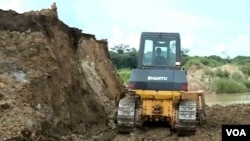It is a metal found in products used by people worldwide, unthinkingly every day. Whether it’s scrolling on a mobile phone or commuting to work in an electric car, nickel is a key part of these high-tech devices. Now nickel — a prime component in batteries — has the markets in turmoil and one Chinese company facing billions of dollars in losses.
Chinese nickel giant Tsingshan Holding Group Co wagered that nickel prices would fall, but instead, Russia’s invasion of Ukraine sent the commodity’s trading prices through the roof last week, driven by concerns about disruptions to the Russian company Nornickel, one of the world’s largest suppliers.
At one point the price surged by 250%, prompting the London Metal Exchange (LME) to suspend trading. The price fell back somewhat when the market reopened Wednesday, but the exchange quickly suspended trading again, saying it was investigating a technical error.
The market turmoil has been bad news for Tshingshan, the world’s largest supplier of nickel, which like many Chinese mining companies has considerable interests in Africa — specifically nickel-rich Zimbabwe.
The Wenzhou-based company, which recorded $19 billion in revenues last year, is building a massive $1 billion iron-ore mine and carbon steel plant in Zimbabwe with a capacity of 1.2 million tons.
Asked by VOA on Wednesday if she is concerned the company’s potential losses will halt or slow the developments in her country, Zimbabwe Minister of Information Monica Mutsvangwa was emphatic.
“No, not at all,” she said. “Project full steam ahead.”
Mutsvangwa stressed that the Zimbabwe projects “are funded from the core capital budget of the stainless-steel business … definitely NOT London Metal Exchange commodity derivative margin trades."
However, Christian Geraud Neema Byamungu, a policy and mining analyst and an editor at the China Africa project, said the losses incurred by Tsingshan “could delay its operations in Zimbabwe for a short period of time.”
“This would be bad news for Zimbabwe, which has high expectations for this project,” he added. “At this stage of the situation we can only assume that it’s a setback and not a real long-term problem since we haven’t measured the real impact of its losses yet.”
Emails to Tsingshan’s headquarters by VOA went unanswered, while Benson Xu, the managing director of the company’s subsidiary in Zimbabwe, did not respond to repeated requests for comment. An email to the Chinese Embassy in Harare also went unanswered.
However, in a brief statement posted to the company’s website Tuesday, the group said it had “reached an agreement with a consortium of hedge bank creditors on a standstill arrangement.” On Wednesday, Reuters reported the giant had reached a deal with two unnamed companies to close out the short positions it holds.
Tsingshan may be reeling from the nickel crisis, but Muchadeyi Masunda, the chairman of one Zimbabwe-based company, Bindura Nickel Corporation, told VOA he was feeling “bullish” and hoped BNC would “get some of this windfall.”
“We’ve been watching with interest and concern the developments on the LME with particular reference to the nickel price, following the Russian invasion of Ukraine,” said Masunda.
At first, he said, “we were rubbing our hands together in fiendish glee,” at the surge in the commodity’s prices. But things moved so quickly the company would now have to play catch-up and accelerate a number of projects, possibly even bringing a disused mine back into operation, he said.
Masunda, who said some of BNC’s products “inevitably end up in China,” would not discuss Tsingshan.
Cobalt conundrum
What happens to nickel prices now depends very much on “what happens with sanctions on Russia,” said Geoffrey Sambrook, who traded on the LME for decades.
“Consumers -- principally stainless steel producers and battery makers -- will be concerned about the robustness of their supply chain,” he told VOA, noting that could encourage companies already looking to develop batteries that don’t use expensive nickel or cobalt.
The latter commodity has proven a recent headache for another Chinese giant with a foothold in Africa.
Earlier this month, a court in the Democratic Republic of Congo, the world’s largest source of cobalt, ordered mining giant China Molybdnenum to suspend operations at its massive Tenke Fungurume cobalt and copper mine until a shareholder dispute is resolved. Congolese President Felix Tshisekedi vowed last year to “clean up” the mining sector and review “infrastructure-for-minerals” deals between the previous government and the Chinese.
While the court ruling on China Moly may be a rare slap on the wrist for a Chinese company, analyst Neema said “Chinese interests in the country remain solid.”




